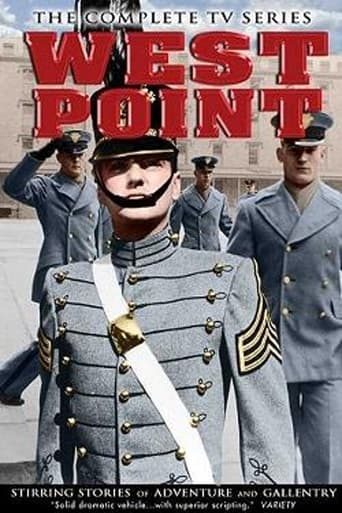

BEING THAT OUR participating in and ultimately winning World War II was just a scant 10 or 12 years prior to this series bowing on CBS, it was more a matter of trend than originality. Television series with the military as its subject were quite popular in the 1950's and '60's. ONE NEED ONLY look at listings from those days to find titles such as: NAVY LOG, CITIZEN SOLDIER, THE SILENT SERVICE, TH FLYING TIGERS, COMBAT! and the documentaries such as VICTORY AT SEA & CRUSADE I EUROPE. Even the comedies were so inclined with entries such as THE PHIL SILVERS SHOW (aka YOU'LL NEVER GET RICH) and McHALE'S NAVY.(OH YEAH, BEFORE we proceed any further, let us say in regard to our Allied victory in WWII, "Way to go Greatest Generation!") WITH THE COMING of this series to our evening tube watching, the service series genre branched out to yet another area of stories in dramatizing the lives and studies, the trials and tribulations encountered by the Corps of Cadets enrolled at the United States Military Academy at West Point.ALTHOUGH WE HAVEN'T seen any of these episodes for over a half century now, we suspect that at least some were based on fact and on the young men who would be our country's future Eisenhowers, MacArthurs and Pattons.THE SERIES WAS originally broadcast by the CBS Television and was a production of ZIV Television; whose domain was much more that of the Syndicated half hour show.
... View MoreIn the West Point series,one program dealt with a "flush in", in which the cadets coordinated an activity that had everyone flush simultaneously, creating a major hydraulic problem in the water system at the academy. In the campus demonstrations on the Vietnam War a decade later, at least one school, Miami University, in Oxford, Ohio, replicated this as a symbol of protest. At a specified time, students all over campus flushed toilets and opened faucets, precipitating a major decline in water pressure. If there had been a fire in town, there would have been a real crisis, as there wasn't enough water to fight a fire. This incident was a factor in closing the university for a time, although it reopened before the end of the term, allowing for graduation, and a confused class situation. Some students suffered sanctions for this and other actions deemed detrimental to the university.
... View More